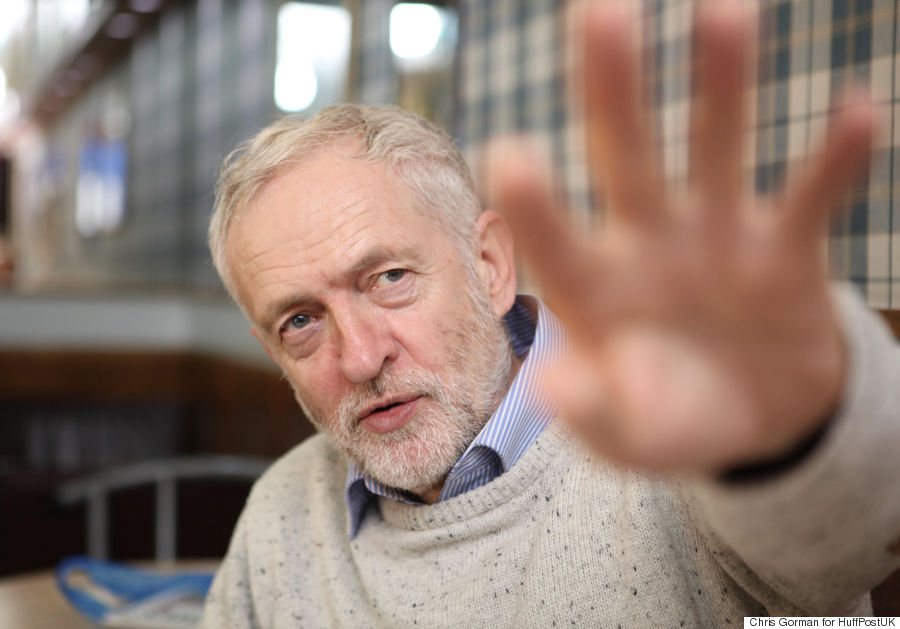 |
| To mark his first 100 days as Labour leader, he talks to HuffPostUK about the learning curve of being in the top job, his plans for foreign policy and his take on the United States Presidential race. |
Jeremy Corbyn is late, but he has a pretty good excuse. A one-man selfie-magnet these days, the leader of the Labour Party can’t get more than a yard down the road without someone stopping to shake his hand, request a phone photo or just have a chat.
He’s been out canvassing for two hours on a council estate in his north London constituency and was waylaid by voters, some of whom were pleasantly surprised that the Leader of Her Majesty’s Loyal Opposition was still diligently tending his local patch.
Arriving on his bicycle at Café Metro, a favourite greasy spoon of his next to Archway tube, Corbyn again can’t move without well-wishers wanting a brief catch-up. Finally, he sits down for a cup of coffee, placing on the table a sheaf of newspapers that say everything about his reading habits: the Morning Star and at least three Irish newspapers.
Interviewed by the HuffPost UK to mark his first 100 days as party leader, the veteran leftwing MP is very much on home ground in his Islington North seat. And away from the cameras and the Westminster hoopla of his new post, what has he been most affected by so far?
“The change of life,” he says, instantly. “In the sense that I’m under far more scrutiny than I’ve ever been in my life before. At one level, I feel irritated by it because nobody really likes it when you’re under scrutiny 24/7, but I’ve learned to live with that.
“The highlight for me is the sheer warmth of ordinary people. I’ve just been to a community centre up the road here. Everybody was saying ‘thank you for being here, it’s nice you’re still with us’, and of course I’m still with them I always will be. So I was delayed singing carols and we sang ‘We Wish You A Merry Christmas’ with great gusto.
“I was just talking to a lady just down here who said she’s only come back into politics because of what we’ve done with the Labour party. She said ‘I see hope’. And it’s that sort of thing that’s such an antidote to the scrappiness, negativity of Westminster politics and what a lot of print media do to me.”
As for that print media, he retains a sense of humour, despite the barbs. “When I was buying a paper just now, this guy said to me, ‘you don’t need to buy any of those, they’re all going to be attacking you’. So I said, ‘no, no, I’ve got no problems with the Irish Post or the Leinster Leader. Or the Morning Star.’”
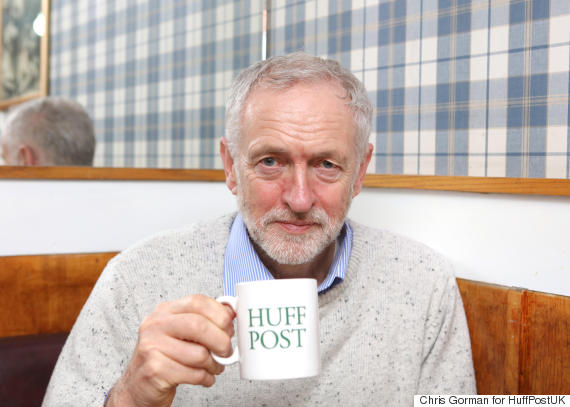
Jeremy Corbyn, complete with mug. 'HuffPost: It's just my cup of tea,' he joked.
He keeps his feet on the ground by visiting not just his own constituency, but also by getting out of London altogether. Corbyn has built into his new routine a strict edict that nearly every week he only spends three and a half days at Westminster and that the rest of the time he’s out on the road, away from the Parliamentary bubble.
“There is a sort of relentless demand on one, so every week Prime Minister’s Question Time comes round, every week there’s a whole lot of things that have to be done.
“And it’s balancing that with the need to not spend one’s whole time in one’s office, dealing with whatever crisis appears. I find if you are in an office, the crisis finds you. If you’re not in the office, the crisis finds somebody else.
“And so I’m very insistent on doing my constituency work and constituency surgery. I had to cancel two interviews yesterday because so many people came. I was there for five hours [which is two and a half hours longer than he’d put in his diary].”
Corbyn has been MP for Islington North for 32 years and at the last general election secured a huge 21,000 vote majority. Asked to list the main lessons he’s learned about the difference between being a backbench MP and being party leader, he is swift to reply.
“The media is one issue. And the levels of hostility I’ve faced are unbelievable. Frankly some of it is just plain abuse. I took a vow a long time ago that I don’t respond to personal attacks, I don’t make personal attacks, never have, never will because I think it just demeans politics.
“And if I’d started responding to all this stuff since the leadership campaign had begun, I’d then be in the trench with them arguing about whether my third cousin removed did or didn’t do something bad in 1956. So what? It’s irrelevant to anything.”
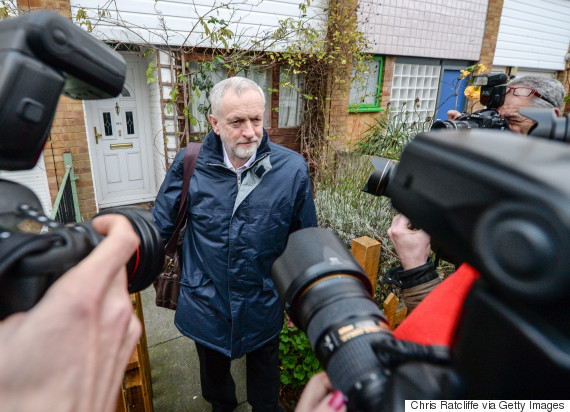
Corbyn faces the media scrum as he leaves his home
But he’s also candid enough to admit that he has found it difficult to express himself clearly when faced with the demands of the media – and of his own MPs, the vast majority of whom didn’t vote for him in the leadership contest.
“The other side of it [leadership] is that decisions come to you and you have to take them. And I make mistakes like anybody else, I will make mistakes. And you have to reflect on it and you have to listen to people. That is the key.”
At a particularly tense Parliamentary Labour Party meeting last month, he came under attack for suggesting in the wake of the ISIL Paris attacks that anti-terror police should not operate a ‘shoot to kill’ policy. Backbench MP John Mann pointed out that his niece had been trapped in a Paris café fearing for her life.
Was it a mistake not being clear enough about ‘shoot to kill’ policies? “I thought I had been clear,” Corbyn says. “I obviously had not been clear, that’s one thing. It’s issues like that you have to recognise that people are always looking for one word you say, not the whole sentence. The late, great Tony Banks once said to me in the chamber, he said ‘Mr Speaker, if ever there is a doubt, no MP ever got the benefit of it’.”
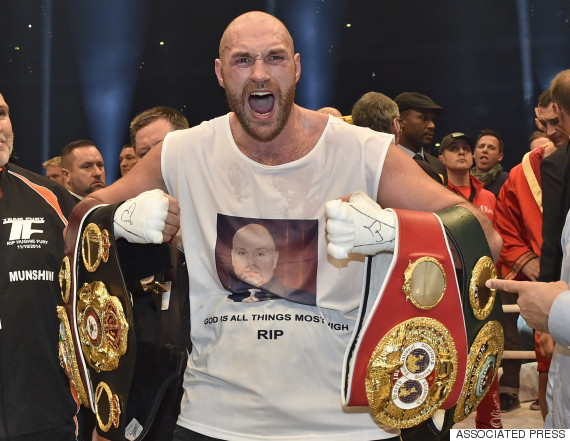
Tyson Fury celebrates
As evidenced by the choice of local papers in the newsagent’s, Archway still has a strong Irish community. But one particular sportsman with Irish links, British heavyweight champion boxer Tyson Fury, has been almost as high profile as Corbyn recently.
Fury caused outrage when he claimed in one interview that women should stay ‘on their backs in the kitchen’ and that the legalisation of homosexuality was a form of evil. Fury is of Irish Traveller descent and claims to be an evangelical Christian.
So what does Corbyn think of the fact that Fury is on the shortlist for the BBC’s ‘Sports Personality of the Year’ 2015 Award? “I wish he hadn’t made those remarks,” the Labour leader replies. “I’m very unclear as to what he actually believes. I’d like to meet him and have a chat, if he’s up for it.”
Would he change his mind? “I don’t know him, so I don’t want to make judgements on him. I think there’s good in everybody. So let’s recognise we live in a world where people are gay, people are straight, people are transsexual, it’s OK, it’s not the end of the world, people have different faiths, it’s OK, it’s not the end of the world.
“I’d love to have a chat with him. I don’t know how he’d be with me, but I’m sure we could find something to talk about. I’m not a great boxer, but I have visited the local boxing club and had a chat with them and they do good stuff with bringing degree of order into kids’ lives, I get on OK with them.” But he won’t be voting for him? “No”.
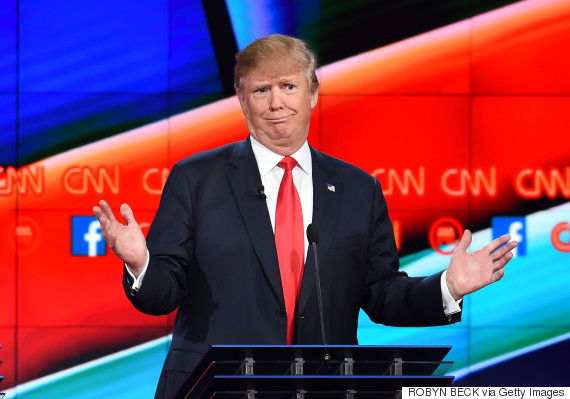
Donald Trump. Islamophobic, who, me?
Yet when it comes to controversy over tolerance, Fury is small fry compared to Donald Trump, the frontrunner in the race to become Republican nominee for the US Presidential election.
What does Corbyn make of Trump? “The idea that somehow or other you can deal with all the problems in the world by banning a particular religious group from entering the USA is offensive and absurd.
“I hope the American people will realise that it’s against everything that’s in the US constitution, it’s against everything that’s about freedom of speech, everything that’s about freedom of religion.”
The online Parliamentary petition to ban Trump from the UK, on the grounds of him committing ‘hate crime’, was the fastest growing of any in British history. It has now reached more than half a million signatures.
But Corbyn is clear that barring the tycoon from Britain is the wrong answer. In fact, he extends a personal invitation for him to see British Islam for himself. “I wouldn’t ban him from coming to the UK,” he says. “If Donald Trump wants to come to Britain, absolutely fine, he can come and join me in Finsbury Park mosque.
“And then he can come to the synagogue afterwards. We can have a chat there. We’d go around. We manage to have a coherent, multifaith, multicultural society in London, in Birmingham, in Leicester, all parts of this country. He’s welcome to come and see. He might learn something.”
He points out that local councillor Michelline Safi Ngongo, who is among his entourage on this busy Saturday, is from the Congo. The Café Metro is owned by a Palestinian, and among its staff members today are Ali from Egypt and Shehzad from Pakistan. All are keen Corbyn fans, as evidenced by the Jeremy Corbyn 2015 Calendar hanging behind the counter.
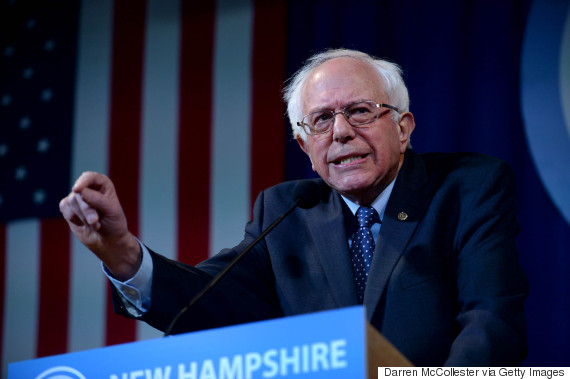
Bernie Sanders, the closest thing the US gets to Corbynism?
Corbyn is the first Labour leader in decades to be unashamed of calling himself a socialist. As it happens, it emerged recently that ‘Socialism’ was the most searched-for term in 2015 in the online Merriam-Webster dictionary. Part of the reason for that was public interest in the rise of Bernie Sanders, the contender for the Democratic nomination for US President.
When Corbyn won the Labour leadership in September, Sanders was swift to offer his congratulations. Sanders said at the time that ‘we need leadership in every country in the world which tells the billionaire class that they cannot have it all’.
What sort of hopes does Corbyn have for Sanders in his race for the Democratic nomination? “I don’t know what the outcome is going to be,” he replies, pausing for thought. “I would guess that Hillary will probably win it in the end.
“But participating changes the debate. His challenging of the inequalities in the USA, of the corporate relief and fat cats compared to the working people, he’s standing up for public services as opposed to private services, I think has changed the debate.
“So whoever wins the Democratic nomination, some of what Bernie has been saying is going to end up being incorporated into that Democratic programme. So it might be that there’s going to be a real debate in the Presidential election, which is about the general direction the country takes. I hope that’s the case. And I’m very impressed by the numbers that Bernie is getting to his rallies and meetings and as he apparently was impressed by ours, in a much smaller country.”
Corbyn was considered a rank outsider in the Labour race at first, famously struggling to get enough fellow MPs to put him on the ballot paper. Could Sanders pull off a surprise and win the nomination? “He’s still got a chance, of course he has,” he said.
Clinton has been talking about hiking taxes for corporations and wealthy individuals. “I rest my case,” Corbyn says, smiling.
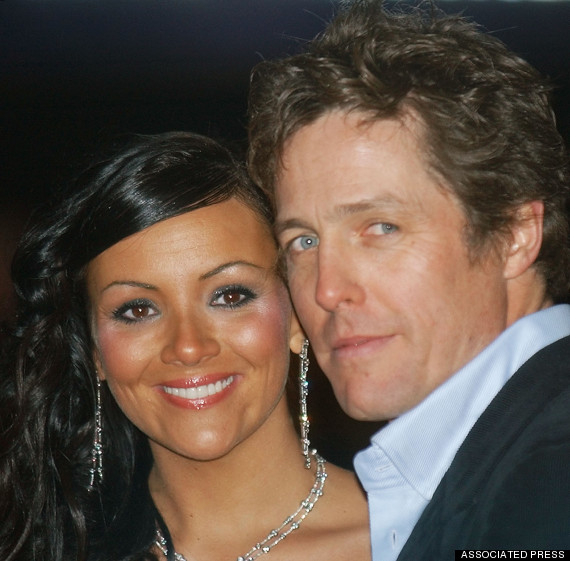
Hugh Grant. The Prime Minister who stood up to the US.
As for the UK’s government relations with the United States, the Labour leader set out his views in his first big policy speech recently. Crucially, he talked of having a ‘more independent foreign policy’. So would it be fair to say he wants an end to the ‘special relationship’ between Britain and the US, and that he wants a different relationship?
“I am concerned that for the past 60 years we’ve essentially followed the US foreign policy all around the world,” he replies. “And with the exception of Vietnam war, in most cases we’ve got involved in either overtly or covertly supporting the USA.
“Not all cases, but particularly Afghanistan, Iraq, Libya, Syria. I think we’ve got to think about this, think about our interventions and think about where we go on these matters.”
He warms to his theme. “I see an active foreign policy as a foreign policy of international law, a foreign policy of human rights, a foreign policy of working with the UN, a foreign policy of looking at fundamental issues facing our planet: environmental degradation, the largest number of displaced people and refugees ever in world history.
“And we are not going to solve the refugee problem by electronic surveillance and razor wire. We’ve got to engage with it.”
But on the key issue of Britain’s alleged subservience to US foreign policy, he would change that? “I would want us to have a more independent foreign policy, a much more focused, human-rights based foreign policy," he replies.
“Because I have spent my life campaigning on human rights and justice, irrespective of the regime concerned. So for example, that’s why I raised Saudi Arabia in my conference speech because we have a very close relationship with Saudi Arabia, their human rights record is not very impressive.”
So, has he seen the British movie ‘Love Actually’, famous for its moment when a fictional British Prime Minister stands up to an American President and tells him ‘a friend who bullies us, is no longer a friend’? And has he run that fantasy through his head, that he is Hugh Grant standing up to Billy Bob Thornton? “I’ll look at it again,” he says, laughing. “I’ll watch it over Christmas. In general you get a lot further if you listen to people, by politeness and respect. I don’t shout, I listen then I talk.”
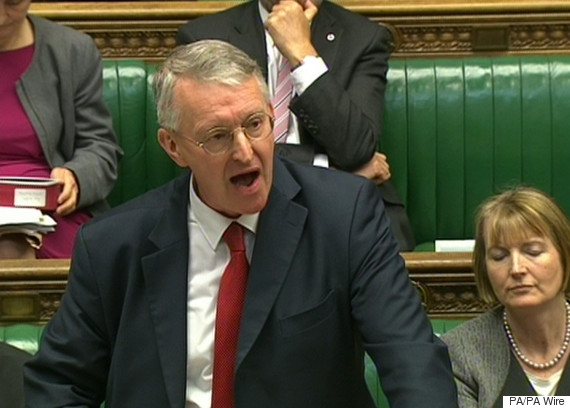
Hilary Benn delivers that speech on Syria
The UK's recent decision to join the US and other states in bombing ISIL in Syria was fiercely opposed by Corbyn - and still is. The House of Commons voted by a big majority to join the coalition, and 66 Labour MPs backed military action after an impassioned speech by Shadow Foreign Secretary Hilary Benn.
But the Labour leader makes clear he unhappy at the reaction on the night. “What I was appalled by was the end of that debate, with mainly Conservative MPs waving their order papers around, clapping and cheering," he says.
"Sorry, we were voting to send bombers in to bomb targets, putting servicemen and women at risk, civilians at risk, you can’t cheer when you’re going to war. That is 1914 Jingoism, that is past.”
Corbyn adds: “I think we rushed into something without enough thought. I made my point in my own speech to Parliament, very carefully. I asked a series of questions and I don’t believe I had proper answers to those questions. Even the Daily Mail said that the questions I’d put – which we thought about very carefully in my office – were relevant questions and have not actually been answered.
The Sun newspaper has reported that not a single one of the RAF's much-hailed Brimstone missiles has been fired in Syria because of a lack of targets. Does that help his own case on Syria?
“It proves something doesn’t it? The Brimstone missiles I was told never miss a target, sorry if you get a target wrong and we all make mistakes."
"I quote in my speech a Syrian family who live in this constituency. They are not lovers of the regime, they are not lovers of the Opposition, they are lovers of their family and life and they said our family is at risk.”
The Syria debate in the House of Commons provoked strong emotions on both sides, not least after Hilary Benn declared that ISIL were “fascists” who had to be defeated by military action.
The word “fascists” inevitably sparked comparisons with the Nazis, though Corbyn has before and since that debate insisted that he is not a pacifist. The Second World War is often described as a ‘moral war’, but can the Labour leader think of any other conflicts that Britain has been involved in that have been ‘moral’?
“The Spanish Civil War, Britain was not involved in it,” he says. “Going back a bit there was the naval blockade to stop the slave trade in the 19th century, that was morally just. Shame they didn’t bother to abolish slavery at the same time.
“I’ve been quite involved in a lot of UN operations over the years, I was a UN observer at the East Timor referendum in 2000. I’ve been very involved in that for a long time.
"There were mistakes made, there were flaws in the programme but fundamentally the UN role in fighting – remember there had been catastrophic deaths by the Indonesian army to suppress the independence movement – the UN did bring about eventually a settlement of sorts.
“I was very pleased to be there as a UN observer and also I’ve been in Congo and Cyprus as a UN observer.”
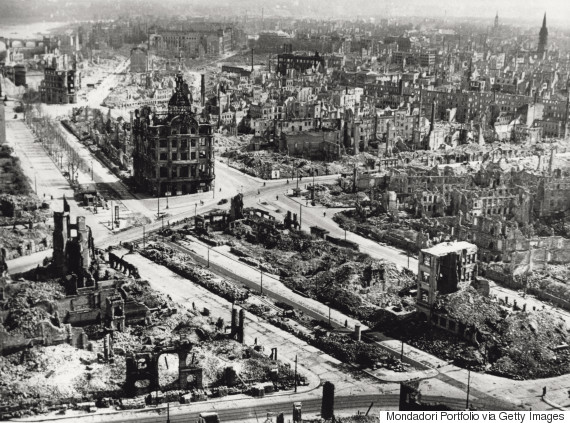
Dresden after the bombs
As for “moral” acts in wartime, the bombing of Dresden by the RAF near the end of the Second World War proved controversial even at the time. Sir Winston Churchill expressed his own concerns within months of the heavy raids that killed 25,000 people in just a few days. Does Corbyn think that the Dresden bombing was needless or immoral?
“What I read of it, it wasn’t a military target,” he replies. “I think there are obviously huge debates about that and whilst one doesn’t want to necessarily reopen all the old sores all the time, surely bombing civilian targets is never a good idea? You can’t punish a population, you’ve got to win them round in the end.”
Corbyn has long supported the Stop the War Coalition, and he refused calls from some Labour MPs for him not to attend their Christmas fundraiser. But what about the future of a fellow Stop The War supporter, George Galloway?
The former Labour MP was expelled in 2003 and went on to serve as a Respect MP. He is currently running as the Respect candidate for London Mayor. Would Corbyn like at some point in the future to have him back in the Labour party?
“There is a five year rule,” he replies. “If he applies in five years’ time, it goes to the National Executive, they decide. Not me.” Pressed further if he would be unhappy at him being readmitted, Corbyn replies: “Let them decide.”
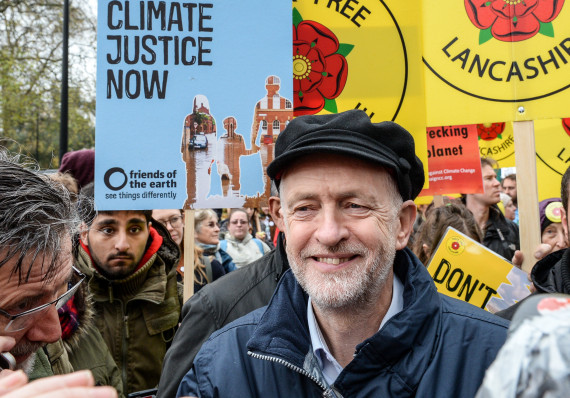
The Labour leader, on the streets
Of course, Corbyn derives his authority over the Labour party from the huge victory he won in the leadership election in September. Winning nearly 60% of the electorate, he can justifiably claim to have the biggest direct personal mandate of any Labour leader in its history.
And with the party membership having soared from around 200,000 to more than 400,000 since May, nearly every constituency Labour party is having to cope with an influx of new blood.
But is there a danger that unless local Constituency Labour Parties engage with them quickly and in the right way, that all the new members may just drift away? “It’s a good question,” Corbyn replies.
“I was just out campaigning this morning in a nearby ward and we had about 30 people out with me. We are a very active and big local party, we have 3,000 members and 2,000 supporters so it’s a huge party.
“And there were quite a lot of new members there this morning who have never knocked on a door in their lives, never done anything for the Labour party before, completely new to it. And they were sort of nervous.
“Because they were knocking on a door for the first time saying ‘hello, I’m Jack I’m from the Labour party, we’re here to listen to your problems’. Engaging people is difficult and unless local parties all have the same open engaging approach that my own constituency does then of course there will be problems. We don’t want to lose people.”
Corbyn adds that the new members are more likely to stay if they are engaged in street campaigning rather than just turning up to party meetings or leafleting for elections.
“It’s also a question of changing the culture of the Labour party away from purely electoral campaigns and purely business meetings,” he says. “It’s also about engaging in open political discussion.
“That’s often counter-intuitive to politics, people like to do things as a step towards X as a step towards Y and so on. And it’s how you deal with people and campaigns. I want to see popular engagement in politics at all levels, that’s what will bring about the changes.
“It’s much more campaigning on the street. You go out petitioning for example on tax credits and we had a big win on tax credits, that helped three million people. That was a big achievement for the first 100 days. We go out campaigning on the Trade Union Bill, not just because it affects party funding but also because it affects so many other things.
“Michelline [Safi Ngongo] down here, a good local councillor, has been with the local party collecting stuff for Calais [refugee camp]. So it’s that kind of engagement in day to day politics that’s so refreshing and it’s good for the Labour party.”
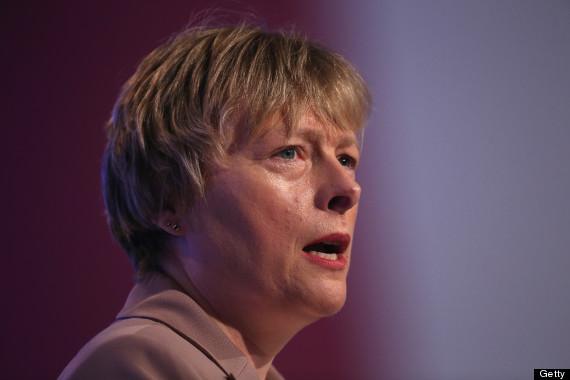
Angela Eagle, in charge of a review of the National Policy Forum
As part of his shake-up of the party, the National Policy Forum is being reviewed by Angela Eagle with a view to seeing how it can work better. So what does Corbyn want out of the process?
“I haven’t completely made up my mind exactly how we’re going to do it yet. But there’s got to be a system which ordinary party members at all levels feel they can contribute to a serious policy debate.
“One idea Tom Watson and I put forward is the idea of a regional online/video/Skype conference discussing issues facing a whole community. The issue could be low wages and everything else. That would be a way of using social media.”
Ms Eagle has a specific remit to build ‘digital’ engagement as part of the review. But could new members who wanted, for example, to change party policy on Trident have a direct say through an email consultation ahead of conference?
“Yeah. I’ve done that on the Syria vote,” he replies. Several Labour MPs were furious at the email consultation on the free vote because they believed that it was an attempt to get local parties to pressurise them to vote against military action. Some questioned the sample size that was used, while others complained they hadn't been emailed at all.
But the Labour leader is unapologetic. “My views on Syria were very well known, I made them abundantly clear from the very beginning. I don’t resile from them at all. I felt that the party members ought to have voice on this. Some were very annoyed about it, but I sent an email to every party member and we got a very large number of replies.
“In 36 hours we got 80,000 replies. There may have been more later. We sampled them and we got overwhelming opposition to bombing. I hope that had an influence on what Labour MPs were thinking, I hope that had an influence on public opinion. I don’t apologise for that, I think it’s the right thing to do. And it’s something I will do again.”
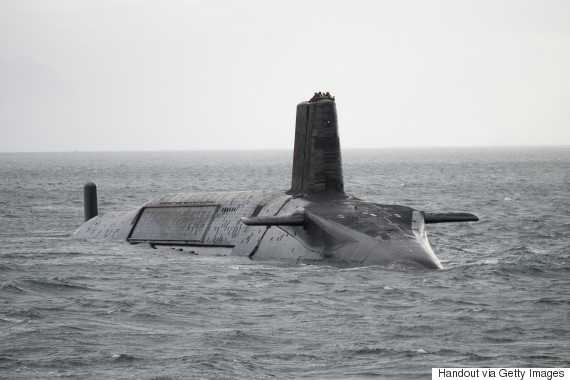
A Trident submarine
And so could a ‘Yes/No’ vote on something like Trident feed into conference? “Yeah. It could do,” he replies. But he stresses that the party needs to build its capacity to deal with email consultation.
“The problem with it is nuancing replies that come in. Because I’ll be quite honest about it, we have a management problem with dealing with responses.
“Within a week we suddenly found we had a backlog of 100,000 emails. So I invited a team of volunteers to come in for a weekend and they got that down to 10,000 by filing, sending on, sorting, analysing and in some cases replying.”
Yet he is determined to push on with the new approach. “There is a problem of engagement but to have a problem of engagement with those numbers of people is surely a good thing. And that’s what we’re working on,” he says.
“This is what social media unleashes and I think politics better get used to the idea it is here to stay.”
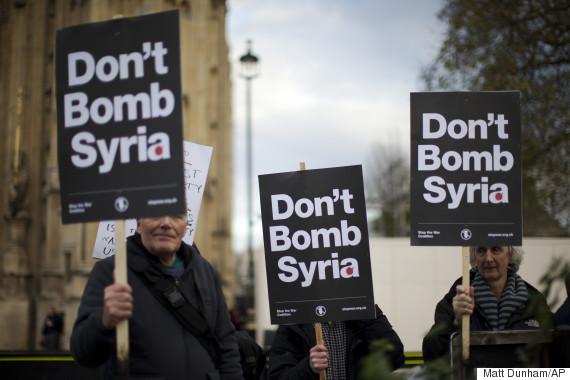
Protests outside Parliament on the day of the Syria vote
As for the vexed issue of mandatory reselection of MPs, Corbyn has told the Parliamentary Labour Party that he has no plans to change the current trigger mechanism. He told the House of Lords Labour group recently that he has ‘no intention’ of changing the rules.
“The process works like this,” Corbyn says. “The boundary review takes place and that will be concluded by 2018. At that point if the sitting MP represents a substantial part of the new constituency a trigger ballot could be on -or not - as is now.
“If it’s a completely new constituency in an area not held at all by Labour then it’s an open selection. If members want an open selection, they have a trigger ballot mechanism to do it. That’s the failsafe system that’s there. I’ve got no proposals to change that.”
But what if party members in large numbers decided that they wanted to use the opportunity of the coming boundary review to overhaul the rules? “It’s not upto me, it’s upto the party to decide,” he replies. “I am not a dictator”.
Pressed further on whether he is agnostic or has a firm view on it, he says: “I think we should all be accountable to our parties but I also think that accountability should be a process of engagement: that MPs do engage with their constituency parties, do engage with their constituents and MPs do change their minds on things because of local opinion.
“That’s not wrong. there’s nothing bad about that and many MPs clearly changed their mind on the Syria vote between what I was picking up when the proposal first came and what happened five days later.” So he’d like to see more of that? “Absolutely, what’s wrong with it?”
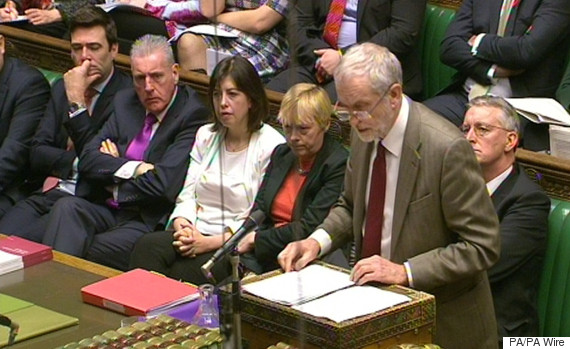
Corybn in action in the Commons
The Syria debate, with its free vote, heralded a new era in policy for Labour in Parliament on such a vital issue of peace and war. Many of Corbyn’s critics have pointed to his 500 rebellions against the party whip over the years, so which one was he most proud of - and which one does he perhaps think he should have sided with the Labour Government?
“I could have sided with the Government on some of the anti-terror stuff [renewing the Prevention of Terrorism Act]. I didn’t. Not because of terrorism but it’s hard to explain to people because it was post-7/7 Britain, but I said we are not going to deal with these problems by getting greater levels of unaccountability of security forces.
“I’m very proud of the fact that I voted against the Iraq war. And proud that I voted strongly not for students to be saddled with thousands and thousands of pounds worth of debt.”
He adds: “Somebody asked me during the election campaign, ‘what regrets have you had?’ I was a bit tired and I said “Je ne regrette rien”. But he smiles, and it’s clear that he still sticks by the verdict.
As well as a new foreign policy and new politics, Corbyn’s third ‘pillar’ is his ‘new economy’. And he’s had no regrets about installing his old friend John McDonnell as his Shadow Chancellor, complete with a string of economic advisers from Thomas Piketty to Joseph Stiglitz.
But what does he say to those who argue that the British public have for a long time been contradictory on tax and spend, wanting European style public services with US levels of taxation?
“I don’t think people think that. I think they do get the combination of ‘you pay in to get a good pay-out’. That’s in the sense of a payout through a social wage, the social wage being a health service, local government, education, social care, mental health services, all those things.
“You pay in and you do get out as a result of it. We’ve had a debate which is essentially the Tory party is trying to shrink the state initially by privatising services, on the belief that somehow or other it is going to be cheaper, it isn’t. And another attempt was PFI, I think most hospital deficits are connected to PFI.
“We then look at the government’s current proposals which are essentially tax cuts through corporation tax, inheritance tax and underfunding of public services as a result. We don’t deal with the problem of the debt and deficit by cuts.
“You grow your way to prosperity, you don’t cut your way to it. John’s proposals is essentially that we invest in an expanding economy, but don’t set an arbitrary date for a budget surplus.”
But to pay for the NHS and more housing shouldn’t he be straight with the public that he’s going to have to put up taxes in some way? “There’s three ways of raising money,” Corbyn replies.
“One is you raise everybody’s income tax, I don’t want to do that. You tax the very wealthiest and the corporations, I think that’s reasonable to look at those areas. The other is to expand the economy and cut down on tax avoidance and tax evasion.
“Inequality is a terrible waste of time, a waste of people’s resources. Low ages are counter-intuitive to an expanding economy, inefficient. You pay more in wages, get more in in tax, you get people living a higher standard, you get more money. It’s a kind of circle.”
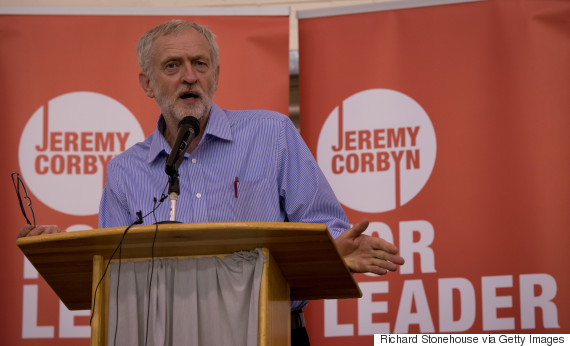
Corbyn at a rally in Nuneaton, exactly the kind of Tory-held marginal Labour needs to win power
Yet while that message may work with a Labour audience, as does his anti-austerity campaigning, how is he going to appeal to the Tory voters in the south and in marginal seats that he needs to win an election? Is he going to appeal to their self-interest or will he just tell them Labour cares more than the other parties?
“There is a self interest in voting for a society where there is health care for all, where there’s a mental health service for all, where there is education service for all,” he replies.
“And above all a housing policy that doesn’t end up with young people staying in their parents’ home until their 30s or 40s because they can’t afford to rent, they can’t have a council place, they can’t afford to buy.
“So my message to them is: think about the kind of world the Conservatives are creating where the disposing of state assets, shrinking the state and in the end you and your children are going to have problems. And adult social care may not be available for those that desperately need it. If we want to live in the kind of decent, cohesive society that I think everybody aspires to, then listen to what we are saying and think about it. Osborne selling off public assets, cutting taxation for the very richest isn’t going to bring that about.”
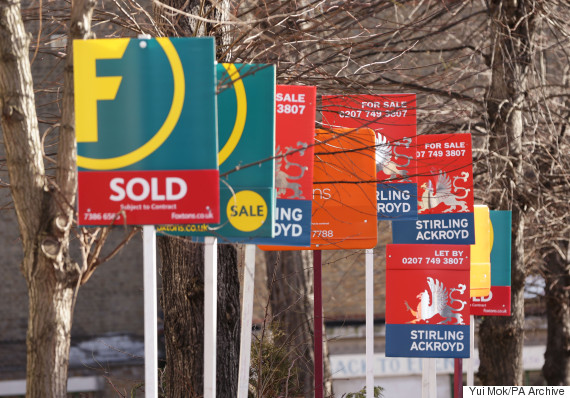
Britain's property market, for sale and for rent, is currently pricing out millions
Given that housing has risen up the political agenda in recent years, how will a Corbyn Labour party convince voters that it will do something radical about the shortages affecting young people and others?
“I absolutely get it on housing. I represent a community that is being socially cleansed. Socially cleansed of people who rely, often in work, on housing benefit to survive. The benefit cap prevents them staying they have to move out and the whole area churns, children leave school they have to go somewhere else.
“So what do we do about housing? One, recognise there is a huge housing shortage. Two, recognise that there a lot of deliberately empty properties through land banking. Three, that the sale of council housing and housing association properties is creating a crisis as deep as created by Right to Buy by Margaret Thatcher.
"In the borough we are in the moment, if the Conservative proposals go through on forced sale, we will be forced to sell 6,000 properties when there are probably 10 to 15,000 families in desperate housing need, it makes no sense at all.”
Those are the problems, but what are the solutions? Corbyn points out that Shadow Communities Secretary John Healey is drafting a set of detailed policies but he already has his own thoughts.
“My priorities are one, invest in council housing with lifetime tenancies. Two, regulate the private rented sector on quality on length of tenure and in areas of high rent levels like London there has to be maximum rent levels put in by region or by income level there’s got to be an affordability there. Germany has a very large private rented sector, it has long term investment, it is fully regulated.”
As for the way young people are priced out of the property market, for sale and rent, Corbyn says it’s a sign of what’s wrong with the economy, away from the growth figures.
“We are running an economy where we pretend that rising property values equals economic growth. It’s nonsense. The rise in value of a stack of bricks and mortar, steel and wood and glass is just that, bricks and mortar, steel and wood and glass. It has the same intrinsic value.
“Instead we have this house price inflation which is claimed to be a good thing. It’s not actually. But there is of course a buy-in to those who own a place.
“I own a house, well it’s a shared ownership,” he says. A twinkle in his eye, he then says: “Me and the bank share it – a mortgage it’s called…I don’t want you to get the wrong idea.”
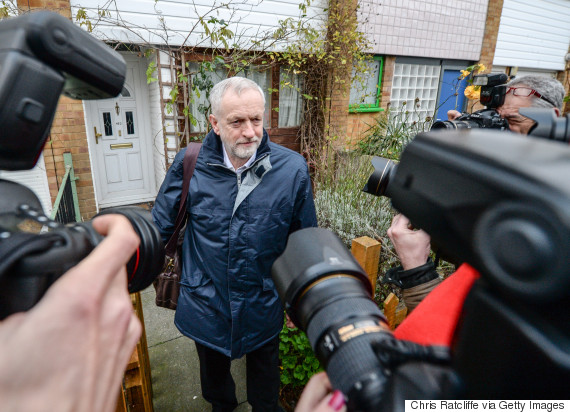
Corbyn meets the media scrum outside his house
There’s often a twinkle in Corbyn’s eye. During the interview, two women who have been sitting at a nearby table get up to leave, but not before wishing their MP well. They give him the thumbs up and he asks “You’re alright? Lovely to see you.”
One of the women notes the size of the Corbyn crew present in the small cafe - his fellow party canvassers, his communications director Seumas Milne, his wife Laura Alvarez, the HuffPost photographer. “How do you cope with this pressure?” the woman asks. “That’s your bodyguard is it?”
One of the women notes the size of the Corbyn crew present in the small cafe - his fellow party canvassers, his communications director Seumas Milne, his wife Laura Alvarez, the HuffPost photographer. “How do you cope with this pressure?” the woman asks. “That’s your bodyguard is it?”
Corbyn laughs and replies: “Laura is the Number One bodyguard. And the other two ladies behind her they’re all bodyguards. They’re my protection.”
When it comes to the media, Corbyn sounds like he’s preparing some further protection. Some in his party want fresh curbs on media ownership in the 2020 manifesto, does he agree?
“I’m a member of the NUJ, I fully understand the importance of an independent media, an investigative media, I get all that,” he begins. “What I don’t get is the way in which the media, particularly the print media, can be routinely abusive and feel that that is perfectly OK.
“I think there does need to be multiplicity of ownership. There does need to be a wide variety of it, and no crossover between broadcast and print media. That’s what I’d want to see. So I am looking at those issues and we will put forward something on it.
“But I also recognise that media has changed a great deal. Social media and internet have completely changed the whole game. We have a 24 hour media age which has it’s ups and downs. The upside is that you can find things out very quickly, the downside is it can be completely inaccurate and gets a life of its own very quickly.”
Some critics point out that three families own more than 60% of Britain’s national newspapers, would he do anything about that? “I would want a divestment of some of that, so share that out a bit more,” he says.
“I think there does need to be multiplicity of ownership. There does need to be a wide variety of it, and no crossover between broadcast and print media. That’s what I’d want to see. So I am looking at those issues and we will put forward something on it.
“But I also recognise that media has changed a great deal. Social media and internet have completely changed the whole game. We have a 24 hour media age which has it’s ups and downs. The upside is that you can find things out very quickly, the downside is it can be completely inaccurate and gets a life of its own very quickly.”
Some critics point out that three families own more than 60% of Britain’s national newspapers, would he do anything about that? “I would want a divestment of some of that, so share that out a bit more,” he says.
“Also local papers do play an important part in communities. There’s a monopoly. If you look at every region, the local papers have often all but disappeared and become some regional editorial function that lives off press releases. I’m an obsessive buyer of local papers. Wherever I go I buy a local paper, I read them on the train. Sometimes they’re great.
Theresa May seems to have shelved ‘Leveson 2’ - the second part of the media inquiry which was meant to cover illegal practices and police corruption. What does he think of that?
Theresa May seems to have shelved ‘Leveson 2’ - the second part of the media inquiry which was meant to cover illegal practices and police corruption. What does he think of that?
“I’m concerned that they are delaying on it. It’s got to be done. We cannot have this degree of practice going on. What was exposed was utterly appalling practices, intrusion on individuals and it’s got to stop.”
As for new media, Corbyn, like many around him in his senior team, believe that they can bypass some of the newspaper criticism by utilising Facebook, Twitter and other tools. The extent of the changes doesn’t daunt him, he says.
“When I was 18 I was in Jamaica as a volunteer, I was there for two years. Then I went round Latin America on my own, I was away from home for a long time. I made one phone call the whole time I was away. And when I phoned my home, they were out. We communicated by letter. They had no idea, where I was going, I didn’t have much idea where I was going. I thought it was all perfectly OK.
“The idea now that you would go travelling around Bolivia or Peru on your own and have no contact with anybody for months on end, they’d be Facebooking and Facetimeing the whole time. In my own lifetime, it’s changed and it’s good, it’s great.”
“The idea now that you would go travelling around Bolivia or Peru on your own and have no contact with anybody for months on end, they’d be Facebooking and Facetimeing the whole time. In my own lifetime, it’s changed and it’s good, it’s great.”
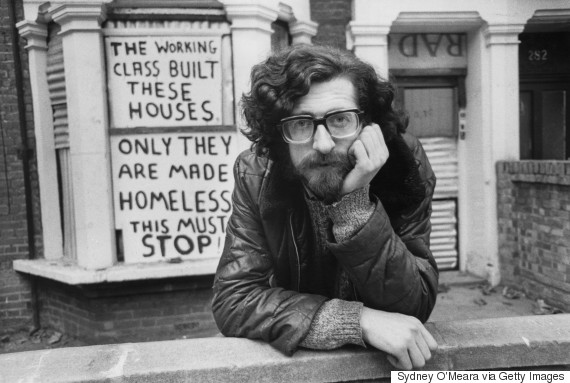
Piers Corbyn, brother of Jeremy, back in 1975. Beards were a family thing.
Corbyn’s brother Piers preferred the ‘old media’ of television recently to talk about his views on climate change. Piers, a meteorologist who believes that global warming is down to the sun rather than man-made emissions, appeared on BBC’s This Week programme to say Jeremy was ‘very much in favour of debate’ on the issue but had to toe the Labour line.
What’s Corbyn’s view of his brother’s argument? Is he an eccentric? “I have the debate with him almost every day. And Christmas lunch can be very long with him.” So he is a firm believer that climate change is man-made, that all the evidence shows it? “We have been throwing a lot of stuff into the atmosphere, all of us human beings, for the past 200 years, particularly in the United States, Western Europe, now China and India,” Corbyn replies. “Does anybody seriously believe that all that air pollution hasn’t had an effect?”
Well, his brother seems to seriously believe that. “Piers and I have a debate about it. He’s brilliant at weather forecasting. And he does do solar activity as a way of predicting weather, he’s brilliant at that. I get that, I understand that. He’s a very brilliant guy, I just don’t agree with him that there is no human factor in climate change. He says there is a natural process.
“That is true, you look at historical records take Antarctic ice cores and all that, there’s clearly changes in temperature and so on over geological time and other time, but I cannot believe that [it’s not man-made too]. I was in Paris and I was fascinated by the process, we held a public meeting with Naomi Klein and myself speaking, 700 people came, we had a great time.
“That is true, you look at historical records take Antarctic ice cores and all that, there’s clearly changes in temperature and so on over geological time and other time, but I cannot believe that [it’s not man-made too]. I was in Paris and I was fascinated by the process, we held a public meeting with Naomi Klein and myself speaking, 700 people came, we had a great time.
“My views are strongly that we’ve got to act. The fact that we’ve managed to reduce carbon emissions during a period of some degree of economic expansion, by regulation, has got to be a good thing.”
David Cameron in early 2014 suggested there was now an evidence based link between flooding and climate change. Will the extreme weather events we’ve seen in recent years change the debate?
“I hope so. The effects of climate change globally are very serious. I was in Cumbria for the floods there and the effects of them. There has to be an approach which is both flood defensive and holistic. Globally, there’s a very large number of environmental refugees as well as political refugees.”
David Cameron in early 2014 suggested there was now an evidence based link between flooding and climate change. Will the extreme weather events we’ve seen in recent years change the debate?
“I hope so. The effects of climate change globally are very serious. I was in Cumbria for the floods there and the effects of them. There has to be an approach which is both flood defensive and holistic. Globally, there’s a very large number of environmental refugees as well as political refugees.”
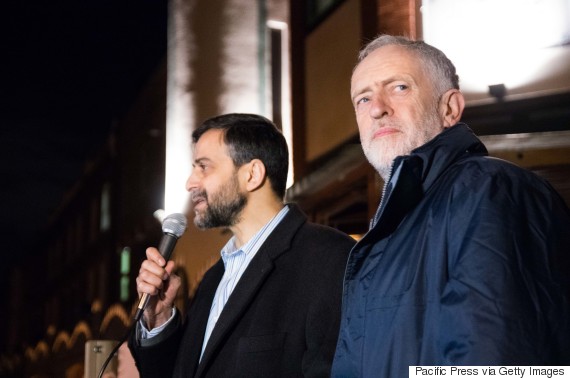
Corbyn, outside Finsbury Park Mosque.
The need to act to save the planet from global warming is held with an almost religious fervour among some environmentalists. But when it comes to religion itself, it is unclear where Corbyn lies on the spectrum of belief and non-belief.
Some people think he is an atheist, others think he’s an agnostic, so where is he on the issue? “I don’t want us to move into religious politics in Britain,” he replies.
“I respect all faiths, I probably spend more time going to religious services than most people, of all types. I go to synagogues, I go to mosques, I go to temples, I go to churches, and I have many humanistic friends and I have many atheist friends. I respect them all. “
But is he a believer, is there a God for him, or is that a private thing? “It’s a private thing.” Is there a spiritualism that appeals to him? “I like looking and thinking at the natural process in this world, how we survive on this planet.”
But is he a believer, is there a God for him, or is that a private thing? “It’s a private thing.” Is there a spiritualism that appeals to him? “I like looking and thinking at the natural process in this world, how we survive on this planet.”
And to those who say he’d make the perfect Buddhist? “None of us do perfection, do we really?” he smiles.
“I suppose I am interested in sustainability of the natural world. And that actually becomes a question of belief. You see my view on environment is it’s as much a mentality, as much as a physical thing.
“It’s a mentality of the limits of what we can do to this planet and the sustainability of it, reuse it, recycle it. If the generation ten on, when you and I are long gone, is going to have a life, then we’ve got to do something about it now.”
So, to put this to rest, if someone writes Jeremy Corbyn is an atheist, is that untrue? “There are so many things about me written that are unfair, unjust and ill-searched that it would be wrong,” he says. “I’m not going any further than that, belief is a private thing.”
So, to put this to rest, if someone writes Jeremy Corbyn is an atheist, is that untrue? “There are so many things about me written that are unfair, unjust and ill-searched that it would be wrong,” he says. “I’m not going any further than that, belief is a private thing.”
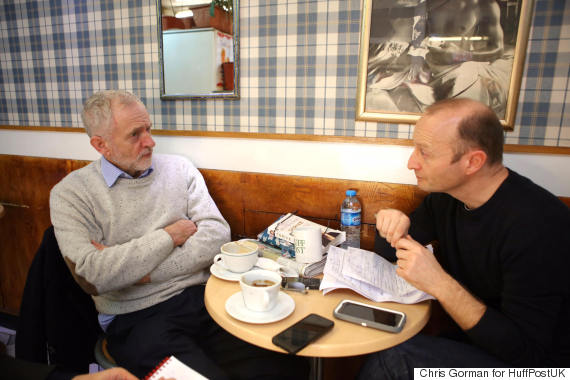
Corbyn showing off his ear-wiggle
How about his sleep regime? Does he get eight hours or does he survive on a punishing Thatcher-style four-hours-a-night as many politicians seem to? “I don’t get eight hours, I never have done. Maybe six. I sleep fine but not very long,” he says.
He then delivers his most chilled-out response of all. “I’m not a stressed person. I believe you’ve got to look at things, you’ve got to do your work, you’ve got to be responsible about it, you’ve got to listen to people about it. But stressing isn’t going to make it better.”
Corbyn is certainly relaxed in Cafe Metro. After a morning’s canvassing and Christmas carolling at his community centre, he’s in good spirits. At one point, he reveals that his party piece is being able to wiggle his ears, hands-free. “Can you move your ears?” he asks his comms chief. “‘I wouldn’t even know where to begin with the ear movement,” is the reply.
Corbyn is certainly relaxed in Cafe Metro. After a morning’s canvassing and Christmas carolling at his community centre, he’s in good spirits. At one point, he reveals that his party piece is being able to wiggle his ears, hands-free. “Can you move your ears?” he asks his comms chief. “‘I wouldn’t even know where to begin with the ear movement,” is the reply.
Undaunted, Corbyn says to his wife: “Did you know that Laura, I can move my ears?” She replies that her father used to be able to do it. Corbyn smiles: “If you see me moving my ears, there’s something very special happening.” HuffPost tried to capture the wiggle on video, but didn’t quite succeed.
Corbyn’s supporters say that much of his appeal stems from his authenticity and his ‘straight talking’. He’s indeed famous for his principled stances on issues, but the public also like politicians who occasionally put up their hand and admit they got something wrong. So has he ever changed his mind on any policy?
There’s a pause. “Hmm. Fracking?” he says, briefly, without elaborating. “In some cases, I’ve taken a kind of agnostic view on something and then realised it’s either good or bad.
There’s a pause. “Hmm. Fracking?” he says, briefly, without elaborating. “In some cases, I’ve taken a kind of agnostic view on something and then realised it’s either good or bad.
“I don’t jump to conclusions on things, yes I have strong principles on democracy, on human rights, on sustainability, on equality in our society. Does it mean you never develop a policy? You do. I was a trade union organiser, I was a councillor, I think you have to listen to people.”
So compromise is not a dirty word? It’s part of politics? “Yes,” he replies, before adding swiftly: “It doesn’t mean you avoid your principles.”
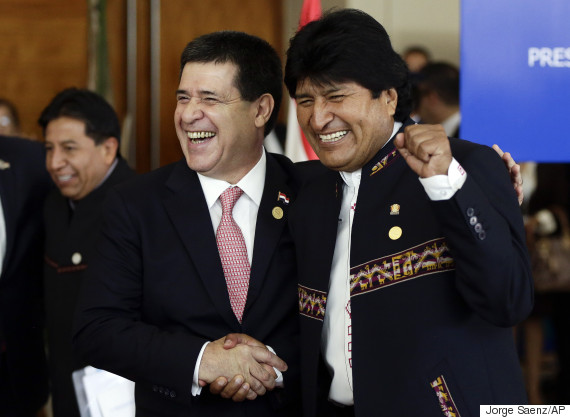
Bolivian president Evo Morales with Paraguay's Horacio Cartes
Corbyn has long been seen as an internationalist who supports other political leaders, from Hugo Chavez in Venezuela to name but one. So, which country would he live in if it wasn't Britain?
"I have travelled in my life a great deal. I've been to probably 70 countries in my life. Everywhere I go, I think 'could I live here?' And you look around, wherever you end up living you make the best of it,” he says.
"I have travelled in my life a great deal. I've been to probably 70 countries in my life. Everywhere I go, I think 'could I live here?' And you look around, wherever you end up living you make the best of it,” he says.
Pointing to those in the cafe, he says: “There’s people in this very place here…he’s [the cafe owner] from Palestine, she's [his local councillor and fellow canvasser Michelline] from Congo, people have made their homes here.
“It's different from where they've come from, they've adapted and made a contribution. If I end up living in the Congo where Michelline's parents are from, I'm sure I would adapt and be fine.
“The most interesting experience in my life was being sent to Jamaica at the age of 18 and being told to work with young people. I was only about two years older than most of the kids I was working with. It was pretty hard going actually, but it was wonderful. I didn't go to university, I did that instead."
But was there any country whose economic and social policies you most admire. Is there one country? Norway, Sweden, Latin America?
“Scandinavian countries I admire. I admire what Bolivia has achieved particularly in the elimination of poverty, sustainability on the environment and sharing out its mineral wealth.
“It’s very interesting what’s happening in Bolivia, it’s a re-flowering of the indigenous cultures in Bolivia which I find absolutely fascinating. I went to Bolivia first when I was 19. I went back two years ago, very interesting.”
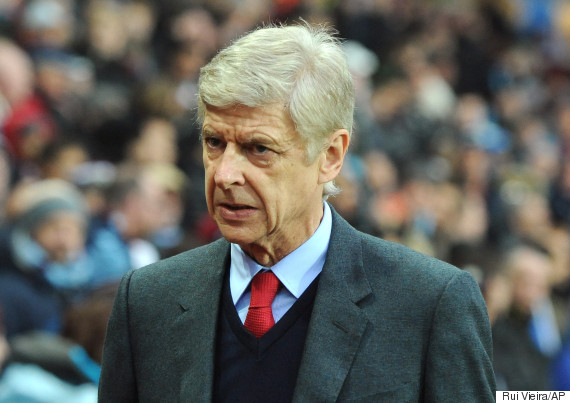
Arsene Wenger, another manager of a red team
One thing Corbyn would miss if he lived overseas would be his local football team, Arsenal. His son Ben works as a coach with the youth team at Watford. Yet Watford are flying high in the Premiership. When Arsenal play Watford, who should win? "I love Ben dearly, but I'm a Gooner,” Corbyn replies.
Asked if Arsene Wenger inspires his own leadership, he admits he does. "He's great manager, he's a very thoughtful man, he's a deeply intellectual man, I've huge time and huge respect for Arsene Wenger.
Asked if Arsene Wenger inspires his own leadership, he admits he does. "He's great manager, he's a very thoughtful man, he's a deeply intellectual man, I've huge time and huge respect for Arsene Wenger.
“I had a good chat with him before the England-France game [after the Paris attacks]. And - can we keep it to ourselves? - he assured me that Arsenal are really in the hunt for the Premiership this season. And I gave him a hug. And I said 'Arsene I hope you're right this time.'
“I've got a lot of time for Arsene Wenger. I think he's very interesting because of his management style and all that. I think he's fascinating.”
“I've got a lot of time for Arsene Wenger. I think he's very interesting because of his management style and all that. I think he's fascinating.”
Thoughtful, patient, and with a unique man-management style is just how many Corbyn supporters view their party leader. Which brings us to one final question, not least given his penchant for Latin America.
Does he like the word ‘Corbynista’? “No,” he replies, firmly. “It’s not about me, it’s about people.” And then he beams broadly: “I prefer Jez”.




Niciun comentariu:
Trimiteți un comentariu